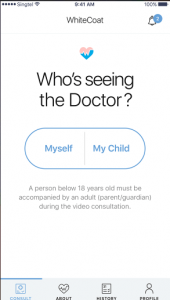One year ago, Bryan Koh was a corporate lawyer at Allen & Glenhill in Singapore. Like his colleagues, he would at times have to clock ten to 12 hours a day. If he ever came down with the flu or other minor illnesses, taking more than an hour to visit a clinic simply wasn’t an option. Fortunately for Koh, he had a doctor at home—his sister. He would consult her and nip the early symptoms in the bud.
Koh asked himself: Could he place a doctor in everyone’s home? A tech geek at heart, he realized that this could happen, and establishing a telehealth service might be the answer.
So he did. In March 2018, Koh founded WhiteCoat.
Even now, telehealth is a relatively foreign concept in Singapore. Until recently, the field was unregulated, but that changed recently. Last April, the ministry tapped WhiteCoat as one of two startups in its regulatory sandbox programme, allowing the company to test drive telemedicine in the city-state.
In Singapore, patients would only use telehealth services after they had met with a physician in person. WhiteCoat set out to change that practice, particularly since more than 75% of the common conditions that Singaporeans visit a doctor for treatment could be diagnosed during a video consultation.
WhiteCoat has six in-house physicians who handle patient consultations through the company’s app. To access one of them, users provide information as prompted on their smartphones and then open up a video portal to converse with their physician. (At a recent event, personnel from WhiteCoat demonstrated this before an audience, and the video quality was sufficient to visually identify certain non-emergency conditions.) The entire process takes about half an hour, which is much shorter than the time taken for an excursion to a clinic or hospital in Singapore. If the patient requires medication, it can also be ordered via the app and then delivered by WhiteCoat’s own medicine dispensary.

So far, the company has not been trying to attract retail users. Instead, it has been providing service packages for corporate clients, which in turn introduce the app to their employees as part of their medical benefits packages. Consequently, over 94% of WhiteCoat’s users are of working age, falling between 19 and 64, with nearly three-quarters of its users aged between 19 and 39.
Though telehealth will never fully replace in-person consultations with doctors—this is something that Koh acknowledges—having a medical professional just a call away can be reassuring in certain situations. Koh brought up the case of a user who was traveling alone in Europe. While connecting between two long-haul flights, her leg became swollen. Knowing little about the local healthcare system, she decided to use WhiteCoat’s app to seek medical advice from Singapore.
During the video consultation, one of WhiteCoat’s doctors was able to identify the symptoms of deep vein thrombosis, and issued a digital referral letter for the patient, who then sought urgent medical attention at a local emergency room.
A report produced by the Philips Future Health Index last year indicated that Singapore has a higher adoption rate for telehealth technology compared to other developed nations. Specifically, 64% of healthcare professionals in the city-state are currently using some form of connected care technology to diagnose, treat, or manage their patients’ conditions.
The government is making other moves to streamline healthcare, chiefly by integrating medical records from public medical centers as well as private clinics, so that patients’ medical histories are fully accessible by medical professionals.
Ageing populations, rising healthcare demands, and ballooning medical costs are just a few areas that healthtech companies are developing solutions for, both in Asia and beyond. Singapore ranked fourth globally in total healthtech deal values in 2018, after China, India, and Japan. Companies that are developing services in the healthtech sector, like WhiteCoat, are managing to carve out a niche in the city-state.
Editor: Brady Ng
